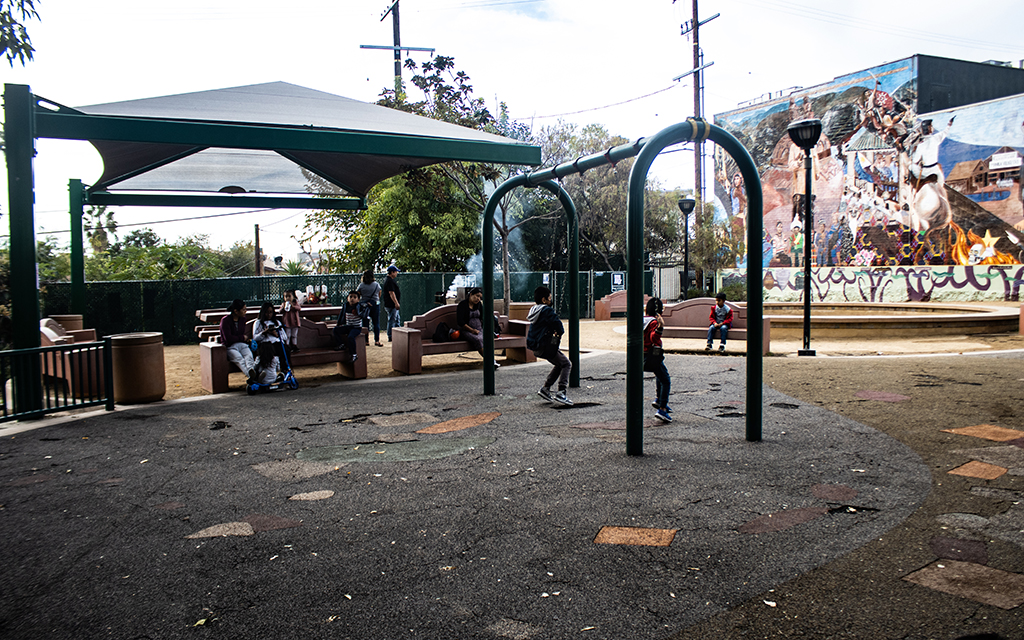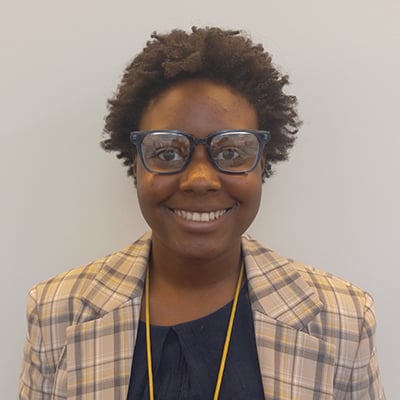
Children try out the swings in Unidad Park in Los Angeles’ Unidad Park, situated in the Historic Filipinotown section of the city, in this photo taken Nov. 21, 2022. (Photo by Emeril Gordon/Cronkite News)
LOS ANGELES – Growing up in the Orange County suburbs south of Los Angeles, Camelia Heins felt like her Filipino heritage was kept at a distance.
She didn’t encounter many Filipinos. Many of her classmates in elementary and high school were Vietnamese or Latino, and she wasn’t exposed to Filipino culture at home beyond the food.
It’s an issue that faces many young Filipino Americans, whether they are first, second or third generation in California and Arizona. It can be a struggle to stay connected, but students and others are finding ways to keep the archipelago’s customs and culture alive in America. They’re doing it through campus organizations, college classes and other ways to connect.
Longtime Filipino Americans have been heartened by the trend, hoping that they can pass their activism and involvement on to the next generation.
“Our community is worth fighting for,” said Jessica Caloza, the first Filipino to be named to the Los Angeles Board of Public Works and a leader instrumental in creating a grand entranceway to the city’s Historic Filipinotown. “And whether or not we fight for years or decades, ultimately it’s worth it because ultimately I know that our next generation of leaders … are going to do something greater than this.”
The message isn’t lost on Heins, who joined Kababayan, a student organization at the University of California, Irvine that taught her more about her culture and allowed her to help other students.
Kababayan (“Fellow Countryman” in Tagalog) is one of the hundreds of college clubs dedicated to celebrating Filipino culture on U.S. college campuses. Now serving as the community and political affairs chair, Heins can immerse herself in the politics and history of Filipinos in America to share at club meetings.
“There’s a history of struggle and resilience and resistance and it’s something I had never known about growing up until I came into like physical spaces in college,” said Heins, whose mother is Filipino and father is white.
As a mixed Filipino, she wasn’t much involved with traditions or customs. But in Kababayan, she has the ability to explore that side of her identity in a deeper way.
“It’s just so much more different than growing up because I really get to talk about my culture, I get to understand the depths of it, which is something that was very much lacking,” Heins said.
Nenita Domingo, a Filipino lecturer at UCLA, not only teaches Tagalog, she introduces students to the history and culture of the Philippines and the country’s sometimes fraught relationship with the U.S.
In learning about the culture, students can better understand their parents and grandparents.
“One student said, ‘When I am in Filipino class, it’s like home,’” Domingo said. “It’s like a home for them where they learn about their culture, their language, and attempt to fulfill (their) language requirements.”
For Domingo, seeing young Filipinos at UCLA embracing their culture through academics is a rewarding experience that revitalizes and empowers the younger generation of Filipino Americans.
“I feel so lucky to have this kind of job to be able to share my culture and help shape the future leaders of the country” she said.
In Arizona, young people struggle to find a sense of belonging outside of their college clubs. In 2020, the Census Bureau counted 73,452 Filipinos in Arizona, making them the largest population of Asians in the state. Even so, it’s difficult for some to find that sense of community. This population is paltry in a state home to more than 7 million.
Arizona State University students Ro Villar and Italia Caro have found their own ways of celebrating their identity.
Coming from a military family, Villar had to adjust to moving between bases in Italy, Singapore, Hawaii and the U.S. However, one thing remained constant: her Filipino pride.
Villar said she encountered relatively few Filipinos on ASU’s campus in downtown Phoenix, despite being a nursing major, which is a common profession among Filipinos. Villar also noticed that the Filipinos she met do not share their identity out of concern it will affect how they may be treated or how the university sees them, she said.
“It’s the American dream to go to the states and go to college,” she said. “But is it worth going for the American dream that means losing yourself like this?”
Caro shares a similar perspective about campus life. Growing up, Caro was close with her Filipino side and celebrated the culture through food and family. Because she is mixed, she felt that she had never fit in and people viewed her as not being Filipino enough.
But in the few encounters with other Filipino students she has had, Caro shared excitement over their similarities.
“It’s nice to have somebody who’s like, ‘Yeah, I totally get it’ and have a space where you can be like, ‘You know, man, I really want to eat lumpia right now,’ without everybody going, ‘What the hell is lumpia? Just get an egg roll from Panda Express,’ which is a whole different thing.”
The Philippine American Student Association is the largest cultural student organization at the university focusing on camaraderie and community between students.
AJ Wilson was the president of the association during their junior year at ASU and is a third-generation Filipino who grew up in Arizona. Wilson went to a liberal arts high school where many students identified as LGBTQ+.
Coming to a large university, Wilson wanted to explore more of the intersectionality between ethnic identity and being a nonbinary person. Wilson knew that it would be difficult to find a space that focused on both topics, especially because many LGBTQ+ clubs focused more on activism and whiteness in the community.
Wilson attended a Philippine American Student Association meeting but initially didn’t expect to come back. But Wilson became more involved in the club and reached for a goal of more visibility for students in similar situations.
“Having that space of just the understanding of what it’s like to be Filipino and what it’s like to be a person of color, and then being able to find my own people who also have the same intersectionalities I feel like it would have come upon myself and it wouldn’t have been easy,” Wilson said.

